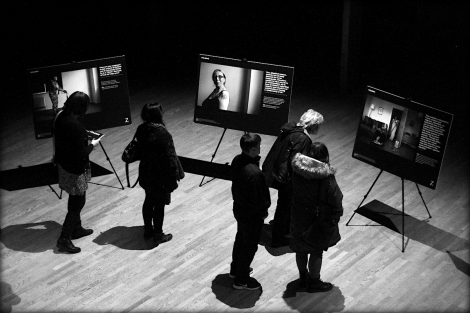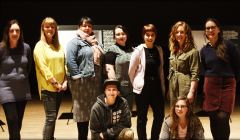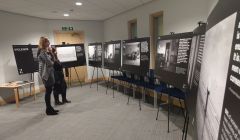Reviews / Defiant dignity in the face of oppression
The powerful exhibition Violence Unseen should be seen by as many men as possible, writes our reviewer Neil Riddell.
DESPITE men’s continued, overwhelming dominance of positions of power in our society, we continue to hear a disturbing strain of thought from a particular type of male – usually middle-aged and white – bemoaning their allegedly oppressed state having been trampled upon by feminism and the #metoo movement.
Such individuals are among us in Shetland too, and it would be great if some of them could take a few minutes to witness Violence Unseen – a concise, powerful, harrowing exhibition on display at Mareel this weekend and elsewhere in Shetland over the next fortnight.
It might help them to grasp that no man can ever fully know how women experience life in our society, and consequently it is incumbent upon us to listen and learn.
Brought to the islands in collaboration between Shetland Rape Crisis and Scottish charity Zero Tolerance, which campaigns to end violence against women by men, Violence Unseen catalogues the range of different forms of abuse and violence endured by women in all walks of life, displaying how their experiences are too often coloured by fear of physical harm or sexual assault.
It offers a succession of diabolical statistics – 99 per cent of women working as prostitutes have suffered violence; nearly half of disabled women have been sexually assaulted; 137,000 women a year are affected by genital mutilation – highlighting the problem’s extent.
In addition to being women living in a patriarchal society, many victims fall into other vulnerable categories – disabled, transsexual, immigrant. Sometimes, in the case of Mridul Wadhaw, they fall into several. “The outsider everywhere: Trans, woman and migrant. Identities, so beautifully one in me yet so oppressive in the hands of the powerful.”
The exhibition quietly demolishes many tabloid shibboleths. It points out that, contrary to common caricature, genital mutilation’s victims are subject to a form of abuse “neither religious nor culturally specific” which can affect anyone, from anywhere.
Become a member of Shetland News
Its seven sombre, monochrome images, taken by award-winning Scottish photographer Alicia Bruce in close collaboration with her subjects, will doubtless invoke a broad variety of emotional reactions. For this reviewer what sticks out is a defiant dignity that each woman, in her own way, displays in the face of oppression.
Shetland Rape Crisis activism worker Lavinia Schmidt said that, while they had seen the individual images already, when they took delivery of the exhibition panels it was a moving and upsetting experience.
The local charity’s trauma therapy project supported 31 female and four male victims, many of whom had experienced multiple incidents of sexual violence, in 2018/19. Its small team continues to deliver the message that Shetland is by no means exempt from the problem, and it is a message this community ought to heed.
The exhibition is part of the UN’s global 16 Days of Activism project, this year using the theme Generation Equality. And, as Wadhaw says, though their experiences as a trans woman will differ from the abuse suffered by some women, “many of our needs overlap, have the same root and require the same solution – gender equality”.
Regrettably it is a message our political class is slow to take up. Labour’s shadow home secretary Diane Abbott, whose portrait features, is notionally in a relatively powerful position compared to some victims. Yet, as a relatively rare ethnic minority female politician, she has been subjected to horrendous racist and sexist abuse including death threats and tweets suggesting she should be “hanged and raped”.
A worrying number of female, often younger, MPs have chosen not to seek re-election to Westminster next month. Some cited a “bullish” and “intimidating” atmosphere and the murder of Jo Cox, while others felt it necessary to install panic alarms.
It is a concerning picture because, while some men in positions of power may be committed to advancing equality, it is difficult to see true fairness being achieved until women occupy a far higher proportion of leadership roles in politics, business and beyond.
Indeed, it could be argued that the lack of vision from those in charge to radically overhaul the system and decisively shift societal attitudes is what makes the immensely valuable work of organisations such as Zero Tolerance and Shetland Rape Crisis necessary at all.
As late Scottish poet Ivor Cutler wrote: “Women of the world: take over. Because if you don’t, the world will come to an end… and it won’t take long.”
Violence Unseen was launched at Mareel on Thursday 21 November and will stay at the arts venue until 24 November before being displayed at Sumburgh Airport (28 November-2 December) and then Hillswick Wildlife Sanctuary (5-10 December).
Shetland Rape Crisis can be contacted by calling (01595) 747174 or e-mailing contact@shetlandrapecrisis.scot For anonymous support call the Rape Crisis Scotland helpline (6pm to midnight) on freephone 08088 010302.
Become a member of Shetland News
Shetland News is asking its readers to consider paying for membership to get additional perks:
- Removal of third-party ads;
- Bookmark posts to read later;
- Exclusive curated weekly newsletter;
- Hide membership messages;
- Comments open for discussion.
If you appreciate what we do and feel strongly about impartial local journalism, then please become a member of Shetland News by either making a single payment, or setting up a monthly, quarterly or yearly subscription.































































